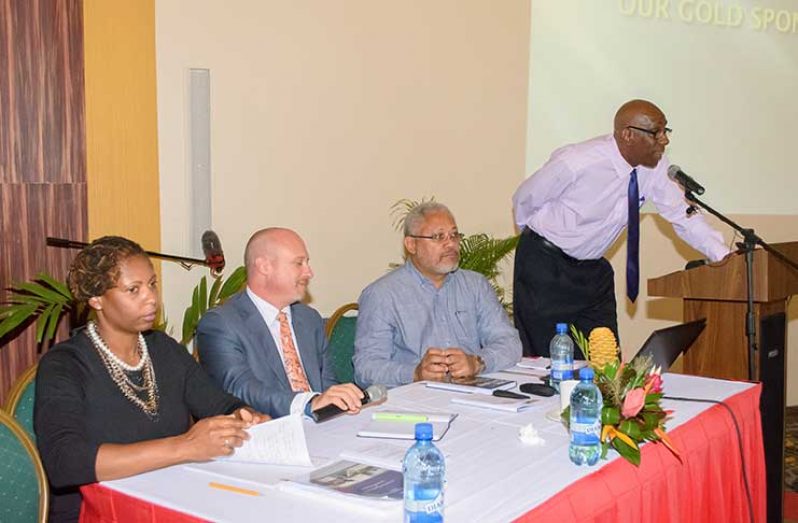By Zena Henry
INTERNATIONAL specialist on policing and security issues relating to white- collar crimes, Perry Stanislas, has warned Guyana to be mindful of foreign hijackers who will not only come to exploit the country’s oil, but claim to be who they are not in financial schemes aimed at any of the country’s sectors.
Stanislas said that very often people who cannot operate in advanced countries would come to less developed ones because they know the systems are weaker, and that the people are inexperienced. He said, “People often look at developing countries as soft. Things they cannot do in Britain, American or Canada, they will come to the Caribbean and Africa and do, and because of our colonial mindset, we are less rigorous, we are less demanding…”
Stanislas was at the time responding to a question on the negative influences of developed countries, to keep less developed countries corrupt for better deals on oil contracts and the supporting services, during an oil- and- gas symposium on corruption at the Pegasus Hotel Thursday.
The event was hosted by the Caribbean Institute of Forensic Accounting (CIFA) in collaboration with the Guyana Oil and Gas Association (GOGA) and the African Business Round Table Association. It saw various representatives from civil society, government agencies, law enforcement and the private sector.
Stanislas said oil companies are powerful multi-nationals with an abundance of resources and are very skilful at corrupting people, “…often with the blessings of the state department of their countries.” He opined that the education, organisation and mobilsation of civil society are major elements in fighting corruption.
Stanislas opined that Guyana must not be “naïve” about the ultimate mission of oil companies, since their information is generated purely for public consumption. He said we must beware of outside companies that would get involved in various sectors, with special reference to unscrupulous Chinese companies that seemed to be making waves in the Caribbean; giving governments shabby work for access to their resources.
To safeguard against these ills, Vicky McPherson, an American legal expert, said that civil society and the press must understand their roles.
To resist corruption in the oil sector, she said all the laws and regulations could be in place, but it boils down to leadership and the personal conviction not to steal from the public. However, the ability of civil society to voice their concerns and the ability and willingness of the press to report on their findings will determine how corrupt a nation becomes after finding oil.
McPherson said once this is achieved, it may help Guyana escape the resource curse, but may not wipe out the incidence of corruption since again, it depends on whether the individual would seek personal benefit from his/her position. Guyanese must be encouraged to demand transparency and accountability.
McPherson was adamant too that Guyana must manage oil expectations. She said the oil sector is capital intensive, not labour intensive; “so managing the expectations of people that they will be directly impacted by the oil –and- gas industry is key, because it will temper some of the anger that the result is by 20/20 no one has a job in the oil- and- gas sector.”
In that case, McPherson agreed that Guyana must strengthen procurement legislation to accurately represent what is needed, since oil money usually drives infrastructure. A public/private framework and the local law that speaks to low- cost contractors receiving contracts were mentioned.
Professor Afra Raymond of the Royal Institution of Chartered Surveyors, said the onus is on countries to ensure large companies do not use them by having the right legislation, methods and strategies in place. In his response, Raymond pointed to Jamaica’s Contractor- General.
This person is responsible for all government procurement in that country. Every year a report is prepared and every government contracts could be found online, in the report and on a hard copy. Any information on government projects could be found, including how many projects a government supporter would have received for the year. Such detailed information is not usually available. It is up to governments and the people to put the system right, he indicated.


.jpg)











